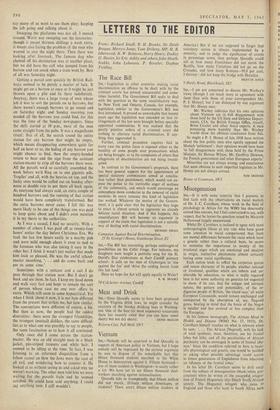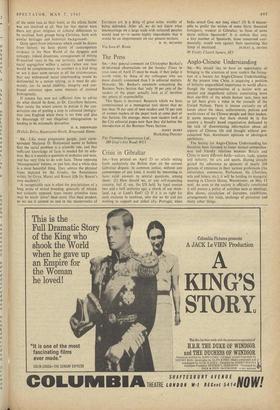MIscegenation
is with some temerity that I presume to
find fault with the observations on racial matters of Dr. J. C. Carothers, whose work in the field of psychology in Africa for the WHO has deservedly earned him renown, but I feel constrained to say, with respect, that he leaves the question raised by Marjorie Hollowood largely unanswered.
Whilst Dr. Carothers is inclined to agree with most anthropologists (those at any rate who have given some attention to racial comparisons) that there are mental differences between the races which have a genetic rather than a cultural basis, he seems to minimise the importance to society of the irrational urges which are emotional and intuitive in origin, instinctive phenomena almost certainly having some racial significance.
Each nation tends to reflect the corporate genius and innate character of its people, whether rational or irrational, qualities which are inborn and un- alterable by education, so what is really required here is for some authority on genetics (or eugenics) to show, if he can, that the unique and intrinsic nature, the pattern and potentiality, of the in- digenous people of Britain, 'the island race,' all white European Caucasoids, would remain unchanged and unimpaired by the absorption of, say, Negroid genes, bearing in mind that the brain of the Negro is smaller and less evolved or less complex than the European.
In his famous monograph, The African Mind in Health and Disease (WHO No. 17, 1953), Dr. Carothers himself touches on what is relevant when
he says: . . The African [Negroid], with his lack of total synthesis, must, therefore, use his frontal lobes but little, and all the peculiarities of African psychiatry can be envisaged in terms of frontal idle- ness.' Since the condition referred to here is basic- ally physiological and genetic, one would be justified in asking what possible advantage could accrue to future generations of Englishmen from inheriting an 'idleness of the frontal lobes.'
In his letter Dr. Carothers seems to drift away from the subject of miscegenation (black /white pro- creation) when he writes of the successful integra- tion of French Huguenots into Dutch South African society. The Huguenot refugees who came to England and those who went to South Africa were
of the same race as their hosts, so the ethnic factor was not involved at all. Nor for that matter were there any great religious or cultural differences to be resolved, both groups being Christian, both with similar heritages and historical backgrounds.
Quite apart from inferences which could be drawn from history, we have plenty of contemporary evidence in the New World of the dysgenic and unhappy, indeed disastrous, consequences of mixing ill-assorted races in the one territory, and whether racial segregation within a nation (when one race would be complementary to another) is a bad thing or not it does seem certain in all the circumstances that any widespread racial interbreeding would be detrimental to a nation relying, as it must do ulti- mately, for its social stability, integrity and con- tinued existence upon some measure of evolved homogeneity.
If science has now not sufficient time to advise on what should be done, as Dr. Carothers believes, then surely the wisest course to pursue is the con- servative one of putting a stop to coloured immigra- tion into England while there is yet time and also to discourage (if not illegalise) miscegenation as tending to be nationally disruptive.
H. B. ISHERWOOD
18 Oaks Drive, Racecourse Heath, Ringwood, Hants.



































 Previous page
Previous page